Last Updated: 9 months ago
“My cat is dying, and I don’t know what to do!”
If this question is on your mind, you’ve found the right place to help you get through these difficult times.
We’ve prepared a detailed guide on the toughest subjects, like how to dispose of your cat’s body and overcome the grief.
Just keep on reading.
My Cat Is Dying: What to DO?
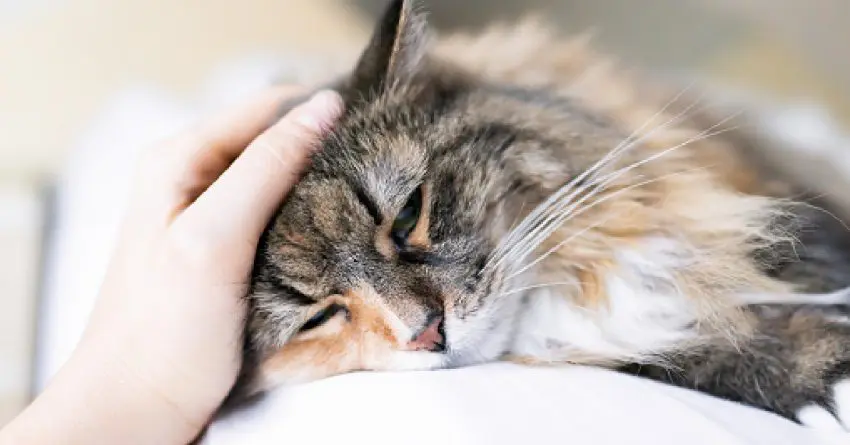
Losing a cat is as hard as losing a loved one. No matter how much you prepare yourself, it’s never enough to cushion the shock or lessen the grief.
It’s not easy to read about such events, but you should know what to do with a dead cat at home.
Otherwise, you might regret not paying your cat the respect they deserved.
To make things easier for you, we’re going to talk about what to do after the cat dies.
Then we’ll cover how to dispose of your cat’s body and how to overcome the grief.
What to Do After the Cat Dies?
When your cat is dying, you hope for a miracle and don’t want to accept it.
But then it becomes a reality, and the pressing question is, “What do I do with the body?”
It’s slightly easier when your cat dies at a clinic.
You can say your goodbyes, and the vets will take care of the body based on your desires.
Then you can go home and cry your heart out until you feel better.
But when your pet dies at home, you will have to do the unpleasant part by yourself. I’m not going to lie and tell you that’s easy.
It’s probably one of the hardest things you’ll ever have to do, but it must be done.
Stay strong and follow this quick guide on what to do with a dead cat at home.
1. Have a Good Cry
No matter if the death was expected or unexpected, it’s going to be a shock when you realize that your cat is gone.
Nothing can prepare you for the thought that your cat will never greet you again when you come home and will never cuddle with you in bed.
You will need all the strength you can muster to deal with the body, so it’s better to have a good cry before it. Let yourself grieve for a while and prepare to do the hard part.
2. Call for Help
You don’t have to go through this traumatic experience alone. Ask a family member or a friend to come over and help you.
Choose someone who will understand how much your cat meant for you and won’t mock your grief.
If you can’t find the strength to touch your dead cat, you should pick a friend who can do it for you.
3. Wrap Your Cat
Place large trash bags or potty pads under your cat as soon as possible. If you can’t do it alone, wait for your friend or family to arrive.
But the sooner you do this part, the better, since it can get messy.
Then arrange your cat in a natural position and wrap your cat (along with the trash bag) in a towel or their favorite blanket.
Then put your cat in another bag and seal it tightly.
If you want to keep your cat’s collar as a reminder, you should remove it before placing the cat in the bag.
4. Store the Body
Death isn’t pretty, no matter when it comes knocking on your door.
Bodily fluids leak from the body, decomposition starts almost right away, and the body becomes stiff and rigid.
So, how long can you keep a dead cat?
Speaking from experience, it’s not long before the body starts to rot and stink.
You can slow down the decomposition by freezing the body in the freezer (a gross but common practice).
Still, I would say you should make arrangements as soon as possible. It will allow you to move on and deal with your grief.
You want to keep the good memories and not allow the horror of death to taint them.
My Cat Died: What Do I Do with the Body?
The worst has happened, and your cat is gone. You’ve wrapped the body and sealed it in a bag.
What do you do now? Let’s explore your options.
1. Bury Your Cat Yourself
It was common to bury pets in backyards or under trees in the past.
If you want to visit your cat’s grave and keep them close, you can still go for that option, provided you’ve got a suitable spot and a wooden box.
However, you should know that it’s not as easy to bury a cat as most people think.
You’ll have to dig a deep hole to avoid attracting predators and covering up the stink. It also shouldn’t be near any power lines or water sources to prevent contamination.
I would also advise you to check your local regulations to ensure you’re not breaking the law.
2. Bury the Cat in a Pet Cemetery
Most people don’t know, but pet cemeteries do exist.
They can be a good option if you want to visit your cat from time to time, but you don’t want to bury them yourself.
You can get your cat a burial plot, a casket, a tombstone, and even a memorial service.
The con is that burying your cat in a cemetery can be expensive, depending on how you want to honor your pet.
Your vet will know if there’s a pet cemetery near you and what services they offer.
You can also Google it yourself and inquire about the prices.
3. Cremation
In general, you can choose between a group cremation or a private one.
The difference is that group cremations are cheaper ($30–$70 on average), and you don’t get the ashes.
Private ones are around $100–$200, and you get your cat’s ashes returned to you.
If you decide to get your cat’s ashes, you might keep them in an urn or box as a reminder, bury them in the garden, or scatter them into the wind.
4. Ask Vet/Animal Control
Don’t worry if you don’t have the budget to bury or cremate your cat. Vets and animal control can take care of the body for a small fee.
You’ll just have to get your cat’s body to the vet or call animal control to come and take it.
There’s nothing wrong with considering this option.
It doesn’t mean that you don’t love your pet, and don’t let anyone guilt-trip you into spending more than you have.
The body is a shell, and your cat’s spirit is waiting over the rainbow bridge.
Your cat doesn’t care what you do with their body as long as you keep them alive in your memory.
How Do You Cope With the Loss of a Pet?
I recently came across a heartbreaking story on Reddit about a cat who died from a burst bladder.
The owner had trouble getting over the grief because he was blaming himself for prolonging the cat’s agony.
Unfortunately, cats often hide their pain and discomfort far too well.
By the time you notice the warning signs, it might be too late, and you might have to make a hard decision.
In such circumstances, you can’t help but blame yourself. It makes getting over the loss of your cat so tricky because the guilt is overwhelming.
Everything around you is a reminder of how you have failed your pet.
I know what I’m talking about. I lost my 7-year-old tomcat in March, and I’m still working through the grief, pain, and guilt.
So, I’ve got eight tips for you that I hope will bring you comfort and make the sorrow slightly easier to bear.
1. Don’t Let Others Tell You How to Feel
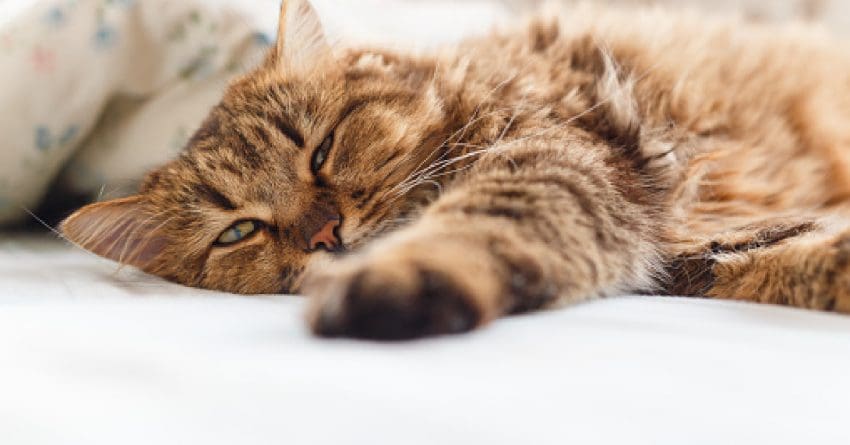
Sometimes, losing a pet is more difficult than losing a person.
Everyone is there for you when you mourn a family member, but not everybody understands why you’re so upset over “just a cat.”
Don’t let anyone tell you that your grief and pain aren’t valid or that you’re silly and childish.
You’ve got every right to mourn a pet who’s been by your side for years!
They’re part of your memories—good and bad ones.
Moreover, don’t tell yourself that you shouldn’t enjoy moments of happiness or that you should mourn longer.
Grief is complicated, and everyone deals with it differently. There’s no shame in crying or not crying for your pet or letting go when you feel ready.
2. Stop Thinking What-If
When you lose a beloved pet, you think about all the things you could have done differently.
What if I had noticed sooner? What if I had done this or that?
It’s painful to play what-if and run all these scenarios through your head.
The truth is that you could never know what would have happened if you’d acted differently.
There’s no point in torturing yourself with these thoughts. They won’t bring your cat back or change what happened.
Put a mental stop wherever you go down that path, and try to think about the good times you’ve had with your cat.
You can also distract yourself with other mundane things to break this repetitive pattern.
3. Understand Why You’re Feeling Guilty
Do you know why you’re feeling so guilty over the death of your cat?
It’s not because you have done something wrong that you have to pay “penance” for.
It’s because you love your cat so much that you feel responsible for what happened.
Moreover, you probably regret not spending enough time with your cat or being too focused on work to pay them enough attention.
Everybody has those hectic days when you don’t have time for yourself, let alone your pet. It doesn’t make you a bad owner.
Take comfort in the thought that you’ve had many happy moments with your cat and that you’ve done your best.
Remember, any lousy pet owner never feels guilty because they don’t care enough.
4. Learn From Your Loss
We’re humans, and humans aren’t perfect or all-knowing. We make mistakes, and sometimes our pets suffer because of our wrong judgment.
The only thing we can do is accept what happened and learn from it.
If you decide to get another cat, you won’t repeat the same mistake.
You will vaccinate your cat, spay/neuter your pet, or install fool-proof balconies and windows.
Guilt can help you become a better cat owner if you’re strong enough to move past it.
5. Talk About It
Talking about your cat can help you process your grief and move on.
Find friends or family that are willing to listen and who won’t ridicule or judge you for what happened.
Other pet owners who’ve lost their pets are also a good idea because they know what you’re going through.
Exchanging stories will make you see that you’re not alone in how you feel and that others have been through it and survived.
Unfortunately, guilt and shame often go hand in hand and make you reluctant to share what happened or how you feel.
But if you don’t talk about it, the wound will fester, and you’ll never heal.
Sometimes, it’s easier to write than talk, and pouring your pain into a social media post can start the healing process. You just have to be brave enough to do it.
However, you should know that people on social media are often too quick to criticize and blame. Find safe forums and groups that won’t be judgmental.
6. Try To Forgive Yourself
I can’t reassure you that you’ll ever forgive yourself for losing your pet.
However, you can’t carry all that guilt, shame, and unhappiness forever. The weight will crush you.
Forgiveness is an essential part of being a cat owner.
You can’t live with a cat if you can’t forgive the scratched furniture, the broken stuff, or being woken at 6 a.m. on a Sunday.
Your cat also forgives you for forgetting to feed them or coming home late.
Your pet will never blame you for what happened or hate you. So, don’t do it to yourself.
7. Do Something in Your Cat’s Name
It can lessen your guilt if you do something in the name of your cat.
Donating to a pet charity, giving a home to a cat in need, or volunteering in a shelter might give you the “penance” you’re looking for.
Moreover, it feels good to help other animals that have no one to love them.
And who knows? Maybe you’ll find a cat to fill the hole in your chest.
8. Do Something to Remember Your Cat
It’s going to be painful to look at all those pictures of your cat in the beginning.
But it gets easier as time heals the wound, so don’t delete them. You’ll regret it later.
Instead, when you’re ready, make a scrapbook or a photo album so that you can remember all the good times you’ve had with your pet.
In time, these moments will overshadow the bad ones and help you move on.
You can also plant a tree on your cat’s grave, have a memorial, make a video (like below), or write in a journal about your cat and all the adventures you’ve had together.
How Can I Help My Other Cat Deal With The Loss?
While cats are still an enigma when it comes to feelings, we know that they’re capable of emotional attachment and care about their owners and other cats.
It’s not the same kind of love people experience, but it’s not less intense.
As such, when one of your cats dies, you might not be the only one grieving for the loss of your loyal companion.
In such cases, you have to remain strong for your surviving cat and do all in your power to help them overcome the loss. Here are 10 tips to help you.
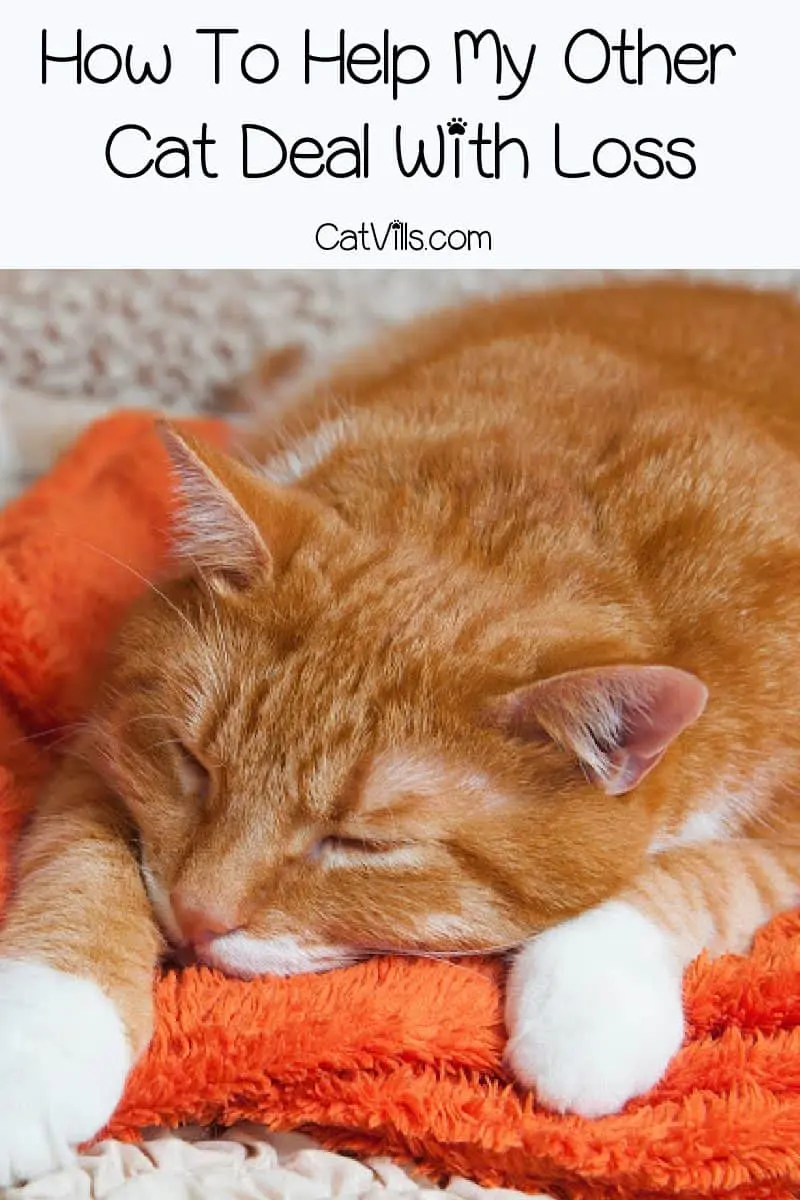
1. Understand How Grief Works For Cats
Many people don’t believe that cats can mourn the loss of another feline.
While we can’t say what goes through a cat’s head, studies have proven that more than 65% of cats exhibit behavior changes after losing another cat.
According to the Companion Animal Mourning Project:
- 70% of cats changed their vocal patterns, meowing more or less than before losing their feline companion.
- More than 40% of the cats had a decreased appetite.
- Many cats slept more or less than usual and changed their sleeping spots.
- Cats became more affectionate and clingy after the other cat died.
Some people believe that these behavior changes are related to disrupted routines and sudden changes, not the actual death of a feline companion.
Others suggest that the cat reacts to your grief by picking up that you’re upset and getting stressed by it.
We know that some cats change after a cat’s death and need time to get back to their previous selves. But we can’t determine how much cats understand death.
While most cats recover, you should be prepared that your cat might change their behavior permanently.
Shy cats might become more confident when there’s no other cat to boss them, for example.
2. Check That Your Cat Is Healthy
Depression, lack of appetite, hiding, and sleeping are common signs of grief in humans and cats alike.
The difference is that your cat can’t tell you if they’re in mourning or feeling under the weather.
As such, you should check with your vet if your cat is lethargic, goes off their food for more than a day, and seems depressed.
It’s normal for cats to be withdrawn or more affectionate after the other cat dies, but any drastic changes aren’t normal.
It’s scary to think that your surviving cat might be sick, but you have to know what’s going on. Otherwise, you’ll never forgive yourself if you could have prevented it.
Moreover, your vet might recommend anti-anxiety products or other natural treatments to help your cat recover.
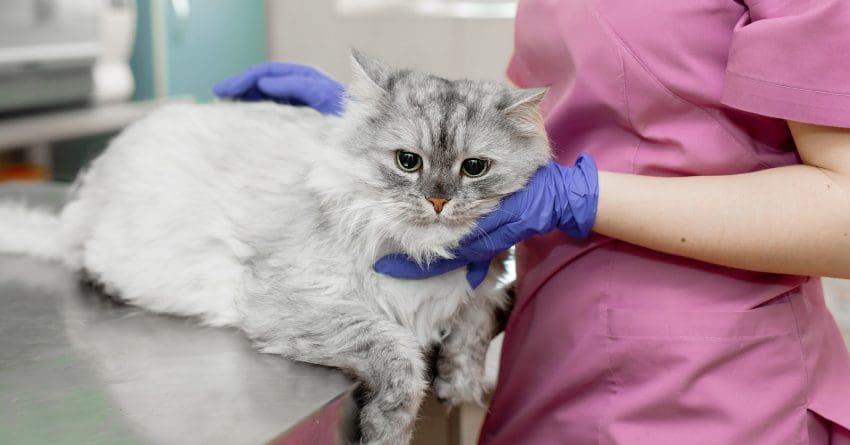
3. Show Your Cat the Body
One of the most heartbreaking sights to witness is a meowing cat searching for their kittens or a lost sibling or friend.
This wailing can go on for weeks and leave you struggling with how to explain to your cat that their friend isn’t coming back.
To avoid this unpleasant situation and help your cat move on, some specialists recommend that you let your cat see the body (unless there’s a risk of infection).
In this way, the cat will know that their friend is gone and won’t look for them. There’s a debate on the matter because we don’t know how cats perceive death.
If cats don’t realize that dead things stay dead, showing the body won’t do much good.
The cat will still wait for their friend to appear and cry for them. However, there’s no harm in allowing your cat to say “goodbye.”
You won’t lose anything if it fails, and you might give your cat some peace if it works.
4. Keep Up the Routine
Cats might have an adventurous and mischievous streak, but they like it when things are predictable and stick to their routine.
That’s why your cat wakes you up in the morning to feed them, even at the weekends. The loss of one cat in a multi-pet home disrupts the hustle and bustle of the household.
That increases your cat’s stress levels because they don’t understand what’s happening, which might make them obsessed and clingy.
I know that you might not feel up to pretending that things are normal, but you must keep your cat’s routine as stable as possible.
Don’t change feeding times, and avoid putting away beds and cat trees (unless contagious).
It will lessen the stress and allow your cat to regain their sense of security.
5. Encourage Your Cat to Eat
A grieving cat might go off their food because they’re far too stressed, nervous, and anxious to eat.
Unfortunately, it can be dangerous for cats to go hungry for more than a day or two.
When a cat starves, fat builds up in the liver and prevents the liver from functioning normally.
That’s why you should encourage your cat to eat. Warm the food a bit, add meat juice, or offer special treats.
Don’t change the diet suddenly since it can cause stomach upset.
6. Spend Extra Time With Your Cat
While cats are not pack animals, they’ve got social needs and often interact with other cats when you’re not around to interfere.
If your cat is used to having company, the sudden loss of their buddy will be a big blow to their tiny world.
You have your work, friends, and family to distract you from your grief, but your cat has a much smaller social circle.
As such, you need to spend more time with your feline until they adapt to the new situation.
You can play games, try new toys, or have a quiet evening on the sofa. The important thing is to be around your cat to provide stability and comfort.
7. Show Your Cat That You Love Them
Usually, cats become more affectionate after the other cat dies because they’re lonely and don’t have another way to express their misery.
You have to reassure your cat that you still love them and that you’re there for them.
Talk to your cat while you’re doing your household chores so that they don’t feel so lonely; pet them more than usual; and do things that your cat likes.
You can also blink slowly at your cat, which is the equivalent of a feline kiss.
8. Encourage Good behavior
As I already pointed out, many cats start meowing more than usual after their feline companion dies.
That could turn into a problem if you don’t handle the meowing the right way.
It’s a bad idea to give treats to your cat to make them quiet.
The cat will quickly figure out what gets them food and will start howling even louder.
Instead, reward your cat with treats and attention when they’re quiet, or distract them with a toy. Be patient, and try not to lose your temper.
9. Provide Entertainment For Your Cat
Since your surviving cat will be alone after your other cat dies, you should think of ways to provide entertainment while at work.
A bored cat can get into trouble and even sneak through the door, looking for their lost friend.
You can hide treats around the house so that your cat spends their time hunting those delicious bites.
Interactive toys are also an excellent way to keep the cat occupied and distracted.
Another option would be to ask a friend to come over to your house and keep your cat company.
10. Adopt Another Cat
If your surviving cat is lonely and miserable, adopting a second cat might improve your cat’s mood and make it more lively.
Many owners recommend this “solution” on Reddit and other forums I’ve visited.
However, getting another cat isn’t a universal fix, and there are some things you should consider.
That’s why we’re going to talk in detail about whether you should adopt another cat in the next part. Keep on reading.
Adopting Another Cat After Mine Dies: Yes or No?
When you lose a cat, it’s natural that you might want to fill the hole in your soul with another.
Your home is so empty without the presence of a purring feline that you miss being woken up early in the morning.
But is it a good idea to get another cat after yours dies, and what should you do if you have another grieving cat?
Let’s find out together.
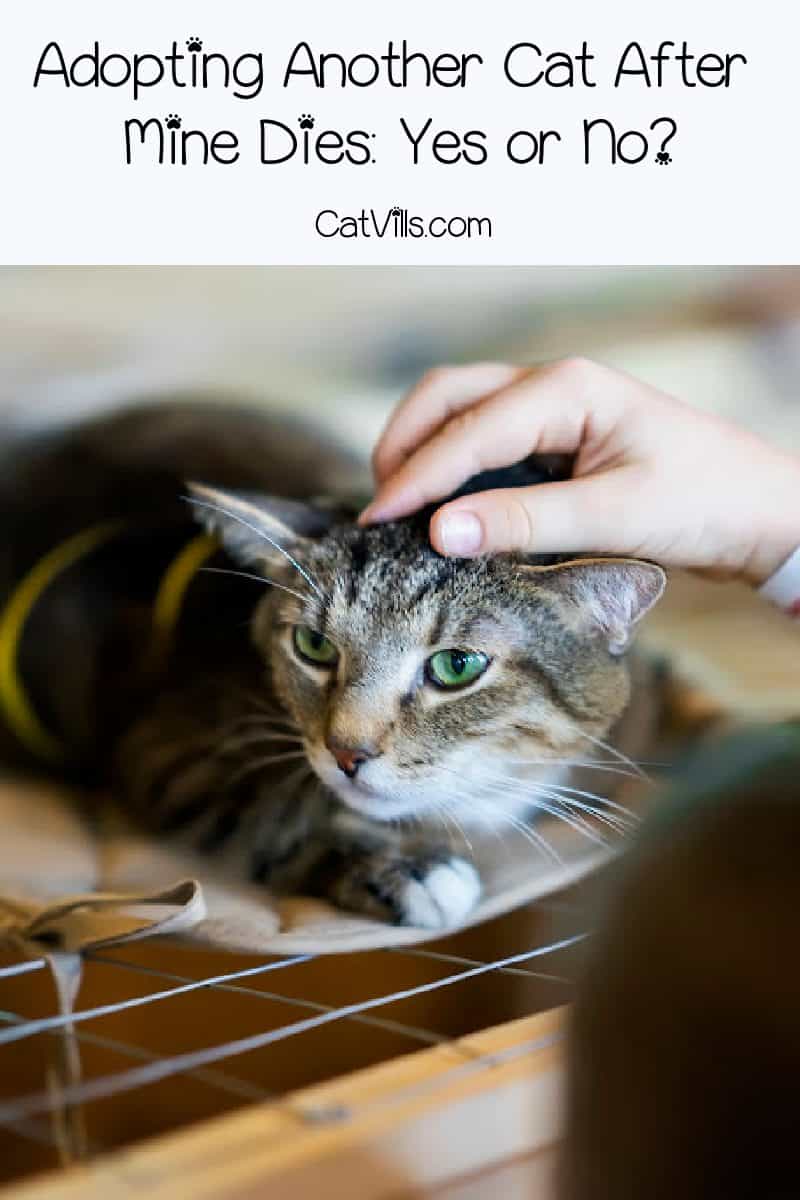
Should I Get Another Cat After Mine Dies?
Some people are so devastated after watching their cat die that they swear they’re never getting another.
They can’t imagine going through the same pain and anguish, and they feel that adopting another cat will dishonor their cat’s memory.
Other owners can’t imagine their lives without a cat around the house and should adopt a new one as soon as possible.
It helps them deal with the sorrow by focusing on something else, and cuddling the new cat eases some of that unbearable pain.
So, to adopt or not to adopt? It’s up to you and how you feel about the matter.
Getting a new cat is not a way to dishonor your dead cat’s memory. You’re not replacing your cat, but giving another animal the chance to have a forever home.
If you think you can open your heart and home for another feline, go ahead and do it.
You can also try fostering if you’re not confident that you’re ready, cat sitting for a friend, or volunteering in a shelter.
In my experience, if you want another cat, you’ll soon find a homeless cat on your doorstep, or another feline in need of help will cross your path.
Before you know it, you’ll again have a furry friend to keep you company and drive you crazy with their antics.
It Is A Good Idea to Get Another Cat That Resembles Mine?
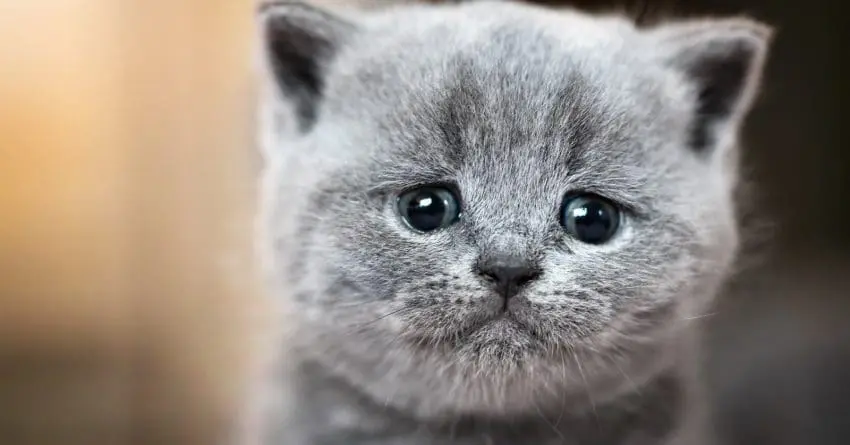
Most owners often want to adopt another cat of the same color and breed as the one they’ve lost.
There’s nothing wrong with this decision, as long as you keep several things in mind:
First, this new cat isn’t a reincarnation of your dead one. It will have a unique personality, temperament, and quirks.
Bonding with this cat can be more challenging because of the memories you’ve got of your dead cat.
It’s also easy to have unrealistic expectations when you adopt a cat of the same color and breed.
You expect that the new cat will behave like their dead one and are disappointed when the cat turns out to be the complete opposite.
How Long to Wait To Get Another Cat After One Dies?
When you’ve gone once through the pain and sorrow of losing one cat, it might be a while until you’re ready to adopt another.
There’s nothing wrong with giving yourself time to grief and come to terms with your loss.
Most specialists will say that you should wait at least a month, but there’s no set limit. You can get another get right away, as long as you’re emotionally ready.
To determine if you’re ready, ask yourself these questions:
- Are you ready to open your heart and home for another feline?
- Do you have the energy and strength to deal with a new cat?
- Are the memories too overwhelming and raw to allow you to bond with another cat?
You might have to wait a couple of months if your cat has perished from a contagious disease.
Some viruses, such as panleukopenia, survive a long time in the environment, and you don’t want to expose a kitten to them.
Talk to your vet about how long to wait before you get another cat if you’re dealing with a contagious disease.
Your vet knows best and will advise on cleaning your house to remove traces of the virus.
If you have a surviving cat, you shouldn’t get another cat right away.
Introducing a new pet too soon will be stressful and might make matters worse instead of better.
Specialists observe that most grieving cats are back to their previous selves in about six months.
However, once you notice that your cat is eating, doesn’t pace around the house, and doesn’t meow as much, they might be ready for a new companion.
Should I Get Another Cat for My Grieving Cat?
As I already mentioned, adopting another cat can help your surviving cat bounce back to their happy self.
However, it should be a well-thought-out decision that takes into account your surviving cat’s personality.
Cats miss each other when one dies, but they can also be utterly unaffected by the loss.
Some cats might even be happier to be a single pet in the household and react negatively to any new addition.
So, should you get another cat for my cat after one dies? If your cat is social, friendly, and seems lonely, they might benefit from the presence of another cat, especially if you’re often away.
However, if your cat often fought with your dead cat, bringing another cat would be a bad idea.
The same goes if your cat is too shy or bossy because it will make bonding with a new pet challenging.
Unfortunately, it’s almost impossible to say how a cat will react to another cat they don’t know.
The fact that your furbaby has lived peacefully with another cat isn’t an indication of how receptive your pet is of other felines.
Bonded cat pairs often get on so well together because they’ve known each other since kittens and have grown up together.
Any new cat won’t have that advantage, and your cat might consider them as a threat.
Introducing a New Cat After One Dies
Introducing a new cat to your grieving cat isn’t that different than bringing home a second pet.
You keep the cats separated for the first few days, make the cats associate each other with positive things, and observe/monitor the interactions to prevent fights.
To be successful, you have to find the right cat to get along with your resident pet.
That could prove to be challenging, especially if you have a senior cat.
Kittens are usually received better because they don’t pose a threat to a cat’s territory and are easily intimidated into backing off.
But, kittens can be too overwhelming for senior cats who don’t have the energy or the desire to play with them.
Ideally, you want a second cat that has a history of getting along with other felines and who is close to your cat’s energy level and temperament.
Otherwise, one cat might bully or pester the other one.
Unfortunately, you might still discover that things aren’t working out between your cats.
It might be because your cat still needs time to grieve their lost friend or because they like being the boss.
It can be devastating if you have to rehome the second cat, but it’s a possibility you have to keep in mind.
Sometimes adult cats are far too territorial to allow a new cat to replace their play buddy.
It’s not easy to say goodbye to your beloved cat when they’ve been with you for so long that you can’t imagine your life without them.
But you have to be strong and do the best you can for your cat when it’s time to let them go.
If you have another cat, don’t forget to take care of them as well. Your pet might be hurting as much as you.
What do you think about our detailed guide on how to deal with a dying cat? Have you ever lost a pet? Share with us your story in the comments.
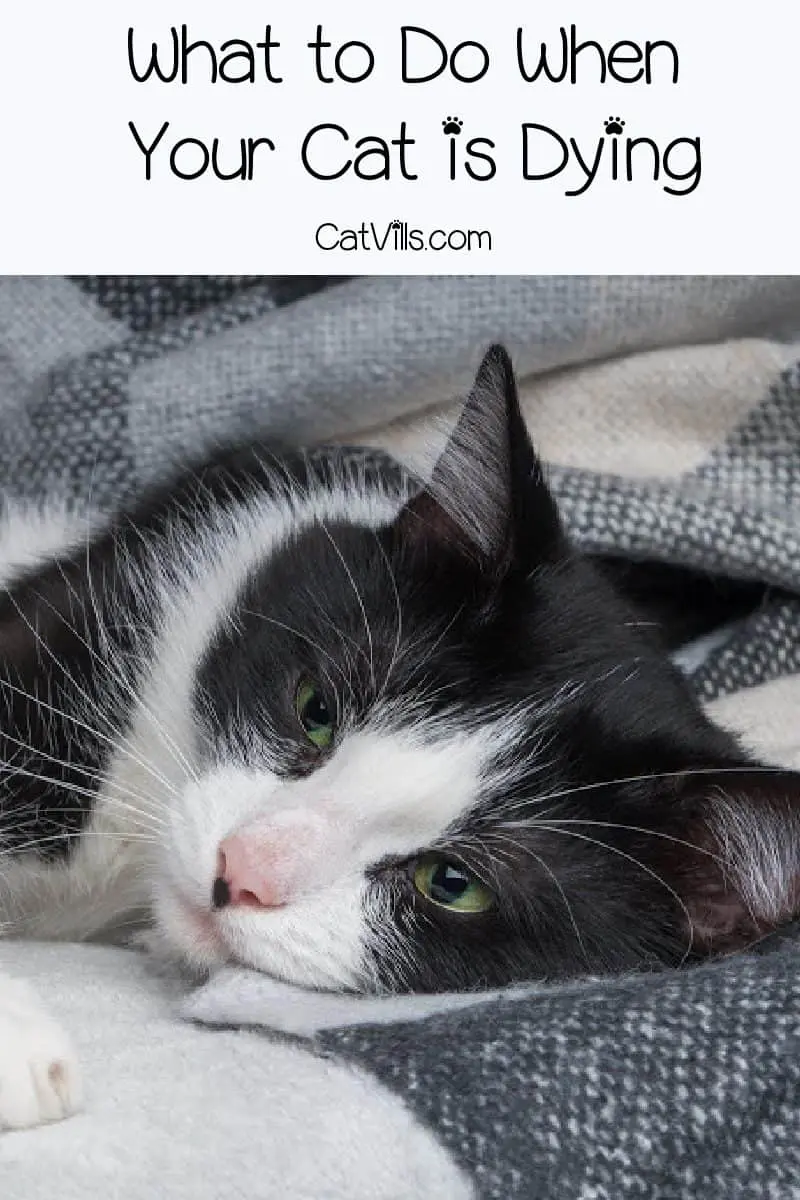

Losing a pet is so difficult. We lost our lab not too long ago and it was so hard.
It is utterly heartbreaking to see your pet go downhill and have to let them go. These are some good tips to help people through this painful process.
It’s an argument that I don’t like to talk about! But it’s necessary!
I remember when my cousins lost their cat. It was so difficult for all of us. Thanks for sharing these tips.
My friends are getting ready to put down their cat that is sick and this is so helpful. I will certainly pass along these tips to them. Thanks.